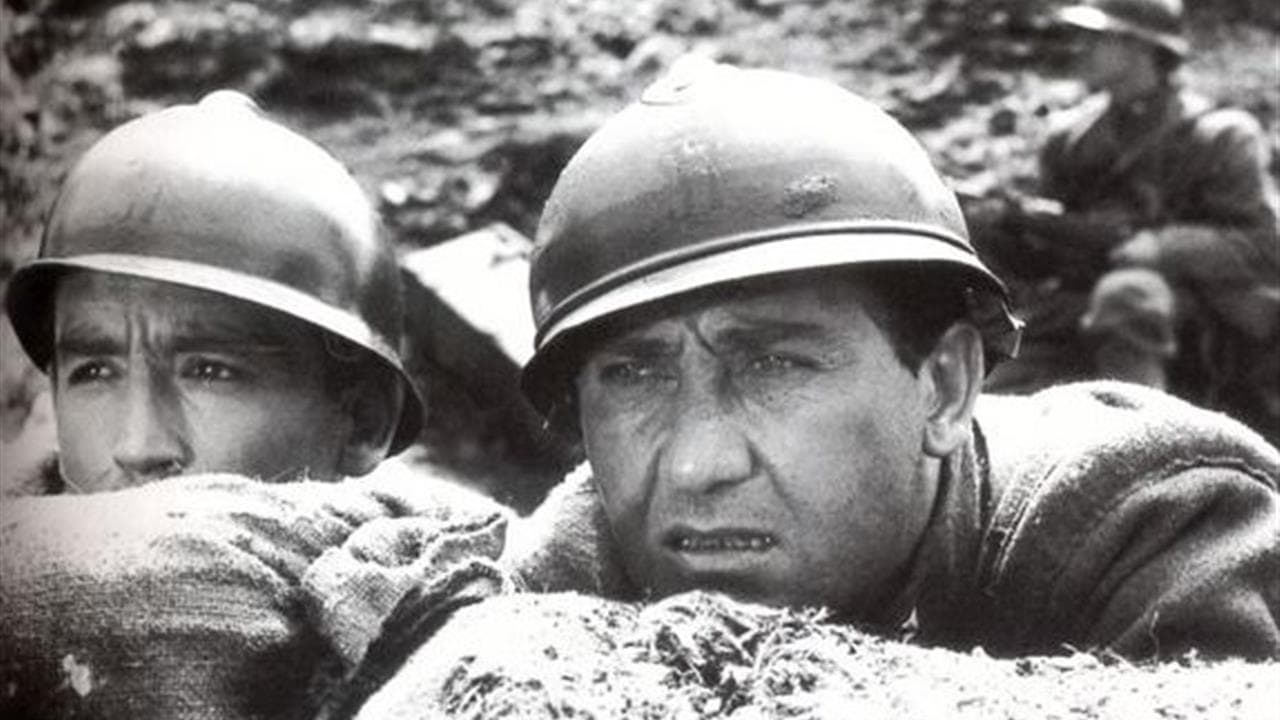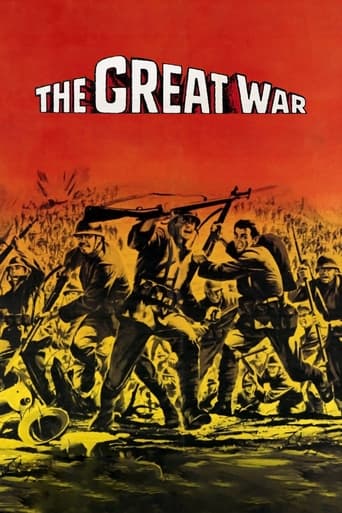

Winner of the 1959 David (Italy's equivalent of the Oscar) Award for Best Film (shared with Generale della Rovere). Winner of the 1959 Venice Film Festival's Golden Lion for Best Film (also shared with Generale della Rovere). Alberto Sordi was voted Best Actor of 1959 for his performance in The Great War by the Syndicate of Italian Film Journalists. The Syndicate also voted Garbuglia's art direction as the best of the year. Nominated for the 1959 Award for Best Foreign Film, The Great War lost to Black Orpheus. COMMENT: For the most thrilling and effective use of genuine CinemaScope, it's hard to go past Mario Monicelli's La Grande Guerra. In this exceptionally lavish recreation of WWI Italian battlefields, Monicelli never allows a single square foot of waste space to appear on his screen. Instead his images are constantly crowded — almost always with men: ragged men, jostling men, cheering men, fighting men, slaughtered men, training men, retreating men, advancing men, hungry men, weary men, stupid men, brave men, victimized men, dead men. Vast columns of marching men are stretched across the screen, thousands often forming just a distant background to the forefront knockabout. Monicelli's idea was obviously to fill his screen to bursting with overflowing action. Somehow he has managed to persuade the producer to open his purse and spend more money on soldiery than Selznick did on Gone With The Wind. Just as the overwhelming hideousness of it all is beginning to lose its power, Monicelli skilfully pulls off a last-minute twist that drives home the film's firmly pacifist message with uncommon force. I'm not a fan of Vittorio Gassman, especially not Gassman in boisterous mode as here — well cast though he may be. But Sordi is ever appealing. Miss Mangano is saddled with a conventional and unlikely characterization which she plays with spirit if not conviction. Folco Lulli effectively repeats his Wages of Fear vignette. Blier's performance seems tired, but the Italian dubbing of his dialogue makes it difficult to judge. The other players are unknown to me, but all these minor roles were credibly cast, with Elsa Vazzoler especially compelling as Bordin's wife and Gerard Herter suitably menacing as the Austrian captain. It's true that the 140-minutes version does seem just slightly too long towards the two-hour mark, though, as said, interest is cleverly lifted soon after. The problem is, what scenes to cut? Those that could easily be removed with little loss of continuity are often the most effective and affecting. Personally, I'd take out Gassman's first long scene with Silvano Mangano — but no exhibitor in his right mind is going to do that!
... View More(Includes spoilers!) THE GREAT WAR stands as one of the essential films exemplifying the "commedia all'italiana" genre, that is, films which while being comedies often have a serious, even tragic undertone. Take our two heroes here, the Roman Oreste Jacovacci and the Milanese Giovanni Busacca (Alberto Sordi and Vittorio Gassman). Caught in the insanity of World War I, this Abbott and Costello duo will do anything to escape danger and responsibility. After being fairly successful at the game, they have the misfortune to fall into the hands of the enemy Austrians, who want to pump them for information. But these two connivers and shirkers, in a rush of untapped patriotism, are unwilling to cause the possible deaths of their compatriots and so will chose or allow themselves to die instead. Circumstances turn cowards into heroes, much in the same way the con-artist played by De Sica in IL GENERALE DELLA ROVERE soars to lofty nobility at the end of that film, completed that same year. Talented director Mario Monicelli has filmed a gritty panorama of the World War I, Italy's first real film on the subject, in which the visuals and the overall "feel" are utterly convincing. The great cinematographer Giuseppe Rotunno has captured the same period feeling that is akin to old-photographs-come-to-life that we would see later in his 1963 I COMPAGNI (THE ORGANIZER). Here he works in wide-screen CinemaScope that is especially effective in following movements of large numbers of soldiers in the battle scenes. The music by veteran Fellini-composer Nino Rota is appealing, and we get the songs and popular chants of the era. Silvana Mangano provides feminine interest as a crafty prostitute. This is a major Italian film of the 1950's and it should be far better know
... View MoreMonicelli is another genius and poet of the Italian cinema. We can only bless him for the long list of masterpieces he created for all of us: I soliti ignoti, Guardie e ladri, L'armata Brancaleone and of course La Grande Guerra. Two cowards, one from Rome (Sordi) the other from Lombardy (Gassman) try to save their lives during one of the most tragic moments (for Italy) of the WWI (the defense on the river Piave). While in some parts the film is truly a blame against the horrors of war, in other parts is somehow patriotic. Even the tragic final changes the protagonists into heroes, but really a strange kind of heroes, very different from the American icon (muscles and bravery). In conclusion, you will find a lot of fun but also thoughtful moments. I beg everyone who read this message to see this movies, it's truly one of the best ever.
... View MoreLa Grande guerra is a real lucid vision of the war that's because the point of view is moved on two characters of the common people with real emotions and feelings, so their military adventures at first creates a sense of funny but step by step everything becomes more dramatic because the war shows absurdities and contradictions that creates real human destruction. The maximum point is touched at the end. Because of this antimilitary soul in 1959 the movie was a real proof of intelligence.
... View More